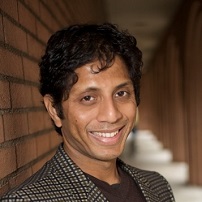
Shrikanth (Shri) S. Narayanan, Ph.D
Professor of Electrical Engineering
Professor of Computer Science, Linguistics and Psychology
Director, Signal Analysis and Interpretation Lab (SAIL)
Director, Ming Hsieh Institute (MHI)
Shrikanth Narayanan received his M.S., Engineer, and Ph.D., all in electrical engineering, from UCLA in 1990,
1992, and 1995, respectively. From 1995-2000 he was with AT&T Labs-Research, Florham Park and AT&T Bell Labs, Murray
Hill--first as a Senior Member and later as a Principal member of its Technical Staff. Currently, he is a Professor at
the Signal and Image Processing Institute of USC's Electrical Engineering department and holds joint appointments as
Professor in Computer Science, Linguistics and Psychology. He is also the inaugural director of the Ming Hsieh Institute
at USC. He was a Research Area Director of the Integrated Media Systems Center, an NSF Engineering Research Center at
USC, and was the Research Principal for the USC Pratt and Whitney Institute for Collaborative Engineering, a unique
partnership between academia and industry (2003-2007).
Shri Narayanan is currently an Editor for the Computer, Speech and Language Journal and an Associate Editor for the IEEE
Transactions on Affective Computing, IEEE Transactions on Signal and Information Processing over Networks, the APSIPA
Transactions on Signal and Information Processing, and the Journal of Acoustical Society having previously served an
Associate Editor for the IEEE Transactions of Speech and Audio Processing (2000-2004), the IEEE Signal Processing
Magazine (2005-2008) and the IEEE Transactions on Multimedia (2008-2012). He holds or has held positions on the Speech
Communication and Acoustic Standards committees of the Acoustical Society of America and the Advisory Council of the
International Speech Communication Association, the BigData SIG (2014-present) the Speech Processing Technical Committee
(2003-2007) and on the Multimedia Signal Processing technical committee (2005-2008; 2014-present) of the IEEE Signal
Processing Society. At USC, he was Chair of the Joint Provost-Senate University Research Committee (2006-09) and, a Past
President of the Phi Kappa Phi Academic Honor Society (2007-08).
Shri Narayanan is a Fellow of the Acoustical Society of America (ASA), the Institute of Electrical and Electronics
Engineers (IEEE) and the American Association for the Advancement of Science (AAAS). He is a member of Tau Beta Pi, Phi
Kappa Phi and Eta Kappa Nu. He holds the first Viterbi Professorship in Engineering at USC. He is a recipient of an NSF
CAREER award, USC Engineering Junior Research Award, USC Electrical Engineering Northrop-Grumman Research award, a
Mellon award for mentoring excellence, a USC Distinguished Faculty Service Award, an Okawa Research Award, IBM Faculty
Awards (2008, 2010), the 2011 UCLA Engineering Alumni Professional Achievement Award, and a faculty fellowship from the
USC Center for Interdisciplinary research. He is a recipient of an Engineer's Council 2015 Distinguished Engineering
Educator Award, a Ten Year Technical Impact Award from the 2014 ACM ICMI, a 2009 Best Transactions Paper award (with
Chul Min Lee) and a 2005 Best Transactions Paper Award (with Alexandros Potamianos) from the IEEE Signal Processing
society and was selected as Signal Processing Society Distinguished Lecturer for 2010-2011. Papers co-authored with his
students have won awards at Interspeech2014-Cognitive Load Challenge, Interspeech2013-Paralinguistics Challenge,
Interspeech 2013, Interspeech2012-Speaker Trait Challenge, Interspeech2011-Speaker State Challenge, InterSpeech 2010,
InterSpeech 2009-Emotion Challenge, IEEE DCOSS 2009, IEEE MMSP 2007, IEEE MMSP 2006, ICASSP 2005 and ICSLP 2002. His
research interests are in signals and systems modeling with an interdisciplinary emphasis on speech, audio, language,
multimodal and biomedical problems and applications with direct societal relevance. His laboratory is supported by
federal (NSF, NIH, DARPA, ONR, Army and DHS) and industry grants. He has published over 600 papers and has 16 granted
U.S. patents.